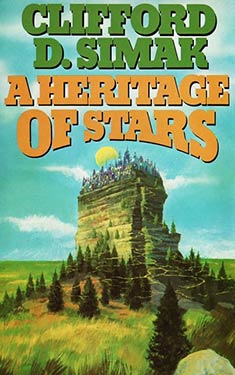Clifford D Simak
Completed 5/31/2021, Reviewed 5/31/2021
3 stars
Another decent book by Simak. Like many of his others, the tale is pastoral, with almost all the action taking place in the overgrown wilderness of a thousand years in the future after the great Collapse. It is sort of a dystopian novel where humans have destroyed all the technology and reverted to mostly nomadic and tribal living. The one holdout is the University of Minnesota, now more of a monastery, but still a place where learning is revered. Even though this book was written in the seventies, it feels older, more like the golden age of science fiction. There’s a lot of exposition and philosophy rather than action, and the plot gets a little clunky at times, but I still enjoyed it.
Living at the U of M is a young man named Thomas Cushing. After his parents and grandfather died, he roamed the wilds until he came upon the university. He was allowed in as a grower of potatoes, but also learned to read and write. While there he became obsessed with the history of the Collapse and the subsequent destruction of technology. Robots were destroyed and their heads stacked in pyramids by many of the remaining tribes. Books about technology were destroyed. But Cushing found a particular book of the history of the Collapse that enthralled him, and some notes in it made a reference to the Place of Going to the Stars. Cushing decides to leave the university to look for the Place. The rest of the book is journey to find it.
I found the book to be a little Wizard of Oz-ish. Cushing goes on a journey and collects a ragtag group of followers along the way. There’s Meg, the “witch” who is a sensitive, that is, sensing things externally and mentally. There’s Rollo the last remaining robot who keeps his parts lubricated with bear fat. Rounding out the group are a man who can speak with plants and a woman who can see into the great void of the universe. Together they encounter difficulties as they look for the Place of Going. The characterization isn’t great, but I did like Meg, who starts out with bravado but is ultimately unsure of her mental gifts. Rollo was also rather fun, as most of Simak’s robot characters are. He’s not a super being, but rather a quirky companion with more humanity than most humans.
The prose is wonderful. Simak displays his gift of the sylvan setting as he does in some of his best stories. The world building is simple, as it is a devolution of civilization, with broken down homes, agrarian communities, and hostile raiders. It represents the downfall of humanity. And that is ultimately the main philosophical question of the book. When this current civilization falls apart, for whatever reason, will humanity rise again or wither into nothing? Simak also makes great points about trying to reason with people who have turned their back on logic and modern thinking, relying on outdated myths that do nothing but keep people ignorant.
I give this book three stars out of five. It’s not as good as some of his other works, like my favorite, Way Station, but it was enjoyable. It has a cozy feeling to it, like you’re in a cabin in the woods with a roaring fire, a rocking chair, and a comfy quilt. I find this with most of Simak’s books, even the average ones. He just has gift with his writing about forests and farms that I’ve never come across with any other writer.

No comments:
Post a Comment